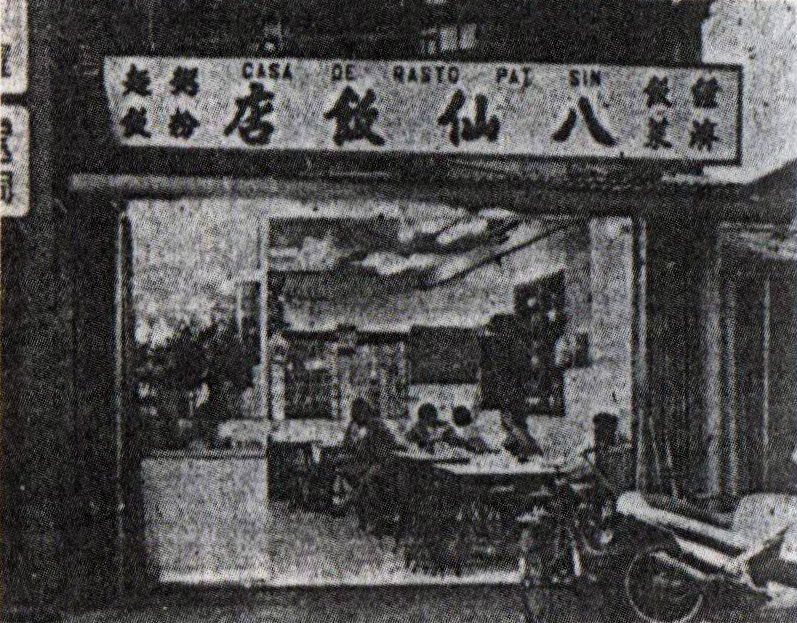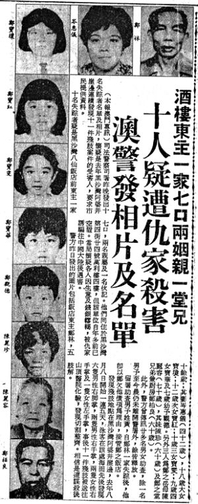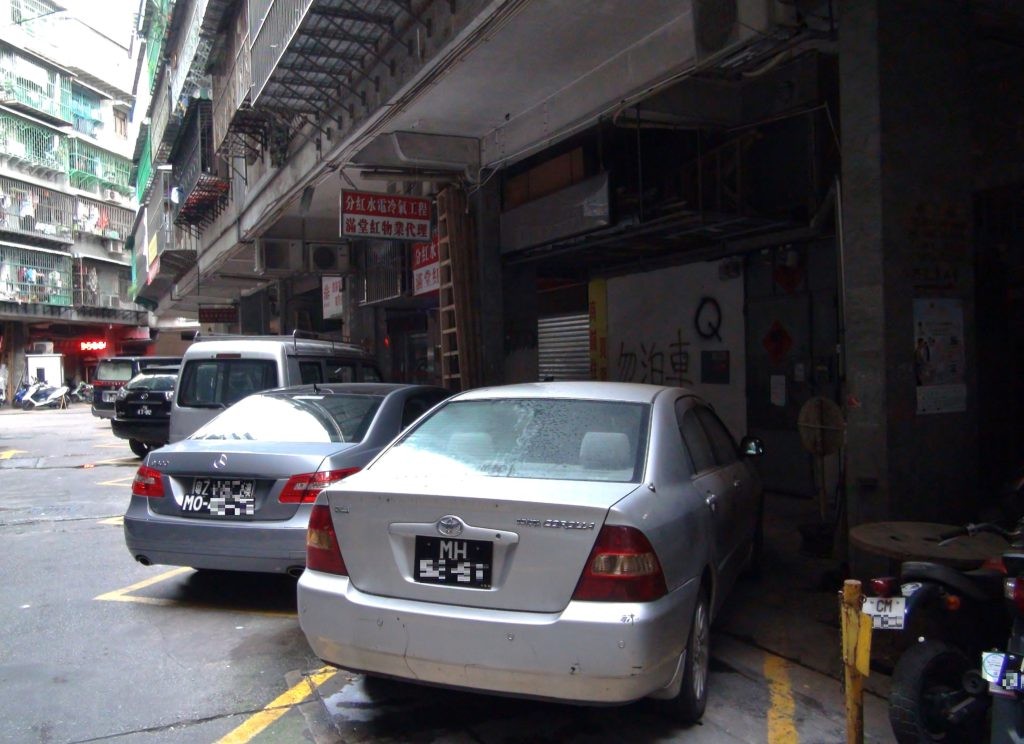Hideous and infamous, the Chinese press in Macao wrote at the time. An entire family, owner of the Pat Sin restaurant in the north of the city, was killed and dismembered due to alleged gambling debts.
The homicide of the Eight Immortals turns 35. Legend has it that the corpses were transformed into pork buns and served at the establishment
The killings of the Eight Immortals, also known as pork bun crimes, took place exactly 35 years ago when a man from mainland China named Huang Zhiheng murdered a family of 10 in his own restaurant because of gambling debts.
The restaurant of the Eight Immortals was a Chinese restaurant that existed near the neighborhood of Iao Hon, during the Portuguese administration of Macau. The establishment was linked to the Eight Immortals hotel and was owned by Zheng Lin, a former street vendor who settled there in the 1960s. His family helped him in the restaurant and everyone lived close to the pasture house. The business prospered, but both Zheng and the woman were addicted to the game.
Huang Zhiheng was born in mainland China before emigrating to Hong Kong in the 1970s. Always with a life linked to the intricacies of crime, Huang has had several identities over the years, especially when he lived in the neighboring region.

In 1973, he became involved in confrontations with a man who allegedly owed him money and killed him. He fled to Canton, where he settled for several years. During his stay in Guangdong province, Huang burned his fingertips to prevent his fingerprints from linking him to any crime committed in the past.
After several quarrels with the woman’s family, who insisted on not accepting him, Huang, about 50 years old at the time, fled to Macau, where it was not long before he became involved in illegal and gambling-related issues, in particular, with the Zheng family.
During a night of alcohol and gambling in 1984, Huang and Zheng became involved in a series of high-risk bets. In the end, Huang won 180,000 yuan from Zheng. The Zheng family was never able to pay the debt. So they both made a verbal agreement that Zheng would hand over his restaurant’s mortgage to Huang if the debt was not paid within a year. Huang agreed and went on with his life. However, after a year, the Zheng family stopped paying. Huang later told the authorities that, due to this default, the Zheng owed him interest, allegedly about 600,000 yuan. This was fatal for the family.

of the Eight Immortals during the 1980s
The crimes of the Eight Immortals took place on the night of August 4, 1985. Nine members of the Zheng family were busy cleaning up the restaurant after closing the establishment after another day of work. Police records at the time reveal that the family was last seen alive by a delivery driver in the late afternoon of that fateful day. In the evening, Huang, enraged at not receiving the money owed to him, entered the restaurant and demanded that the Zheng pay him 30,000 yuan (the police confessed that he even reduced his demand to 20,000 yuan) of the debt incurred.
Huang was more agitated when Zheng Lin refused to transfer ownership of the restaurant, as agreed a year earlier. It is not known for certain what happened at that time, but the Chinese press at the time – since the whole crime seems to have passed by the Portuguese community – wrote that Huang would have become aggressive towards the Zheng, breaking a bottle of beer and using the uneven and sharp edge as a weapon. Then he took Zheng Lin’s son hostage and forced the other family members to arrest and gag each other while pointing the broken bottle at the boy’s neck.
But things got worse. Huang later confessed to the police that one of the family members broke free and started screaming. The murderer stuck the broken bottle in that person’s neck. After that, he decided to kill the whole family by strangulation or even with the broken bottle. In order not to leave any trace, Huang – who knew all members of the family well – still attracted one of Zheng’s sisters, who would be elsewhere, to the restaurant, where he ended up killing her.
Huang dismembered the bodies over the course of eight hours and placed them in black plastic trash bags. Some bags threw into the sea, others lay in several dumps. The slaughter was over. The murderer recovered the money, kept the restaurant and also the Zheng family home.

the portrait of the murdered Zheng family members
The next morning, the driver of the delivery truck who delivered goods to the Zheng the previous afternoon found the restaurant with a sign on the door stating that the restaurant was closed for three days. Surprised, he went to the Zheng home, where Huang was. Upon opening the door, the killer told the man that the Zhengs had gone on an urgent trip to mainland China.
Four days after the crimes, on August 8, 1985, a swimmer found eight pieces of human limbs on a beach in Macau. At first, the police suspected they could be smugglers bitten by sharks, but a closer examination of the human body parts found revealed that precise cuts had been made. This discovery led to a deeper police investigation and a search for possible missing persons.

In the following days, the forensic investigation determined that the members found belonged to at least four different people. Another three human body parts hit the shores of Macau’s beaches during the following week. These discoveries generated significant interest from the police and the press, and several theories have been put forward about what happened. The last parts of the bodies of the killings of the Eight Immortals were only found in the trash, four years after the crime, in 1989.
After relatives of the Zheng reported their disappearance, the police ended up connecting the loose ends and concluded that the human body parts found during all those years belonged to that family.
Meanwhile, as if nothing had happened, Huang had reopened and continued to operate the Eight Immortals restaurant. Despite being an unusual act, it did not justify any surprise in people, since everyone knew that Huang was known to the family and had the documents of the business in his possession. To make more money, the murderer rented the Zheng home. Everything seemed perfect until the police started to suspect.

where the Eight Immortals’ restaurant once stood
When the police decided to search Hung’s assets, they discovered documents belonging to Zheng Lin, as well as student cards for the family’s children. Huang tried to flee Macau, but ended up in prison on September 28, 1986. He was charged with the murder of all ten members of the Zheng family and sentenced on October 2 to prison terms.
The public revelation that Huang Zhiheng continued to operate the restaurant for several months after dismembering the bodies of the former owners resulted in the urban myth that he had cooked his victims in pork buns.
While in prison, Huang was attacked by another prisoner the day after his conviction. With that, he was taken to the hospital, where he tried to escape without success. Finally on October 6, he confessed to the crimes and detailed to investigators how he killed the Zheng family. Huang attempted suicide twice, successfully achieving it on December 4, 1986, after cutting his wrists with a can lid. He left a suicide note and a letter to a Macau newspaper, explaining his actions and stating in the note that the suicide was not due to the remission of his sins, but to get rid of the chronic asthma he had suffered for years.
The crimes of the Eight Immortals came to the cinema in 1993, in the Hong Kong film, “The Untold Story”. The film features a fictionalized version of the Zheng family murder, and it is rumored that cannibalism had occurred after the deaths of the ten people.



